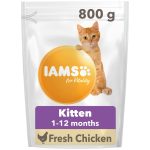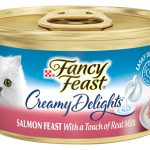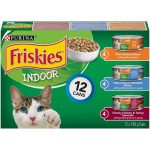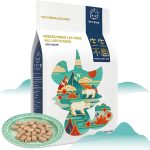The Ultimate Solution For Rodent Ulcers: Discover The Best Cat Food For Optimal Healing!
Best Cat Food for Rodent Ulcers
Welcome, Cat Lovers, to our comprehensive guide on the best cat food for rodent ulcers. If your feline companion is suffering from this painful condition, it is essential to provide them with the right nutrition to promote healing and alleviate discomfort. In this article, we will explore the top cat food options specifically designed to address rodent ulcers, providing you with all the necessary information to make an informed decision for your beloved cat’s health.
Overview
Rodent ulcers, also known as eosinophilic granulomas, are a common skin condition that affects cats. These ulcers typically manifest as raised, red lesions on the lips, chin, or other areas of the face. While the exact cause of rodent ulcers is unclear, it is believed to be an immune-mediated response to various triggers, including allergies and autoimmunity. A carefully formulated diet can play a crucial role in managing and preventing rodent ulcers in cats.
1 Picture Gallery: The Ultimate Solution For Rodent Ulcers: Discover The Best Cat Food For Optimal Healing!

What is the Best Cat Food for Rodent Ulcers?
When it comes to choosing the best cat food for rodent ulcers, several factors need to be considered. Here are some important points to keep in mind:
🐱 High-quality protein: Look for cat foods that contain high-quality protein sources, such as chicken or fish, as they provide the necessary amino acids for tissue repair.

Image Source: petsumer.com
🐱 Limited ingredients: Cats with rodent ulcers may have sensitivities or allergies to certain ingredients. Opt for cat foods with limited ingredients to reduce the risk of triggering a reaction.
🐱 Omega-3 fatty acids: These essential fatty acids have anti-inflammatory properties that can help reduce the severity of rodent ulcers. Look for cat foods that contain fish oil or flaxseed as a source of omega-3s.
🐱 Moisture content: Increasing your cat’s water intake is important for their overall health and hydration. Wet cat foods can be beneficial as they provide additional moisture compared to dry kibble.
🐱 Natural ingredients: Avoid cat foods with artificial additives, colors, and preservatives, as these can potentially worsen the condition. Opt for natural, wholesome ingredients instead.
🐱 Veterinary recommendations: Consult with your veterinarian to determine the best cat food for your cat’s specific needs. They can recommend specialized diets or prescribe therapeutic options if necessary.
Who Should Use the Best Cat Food for Rodent Ulcers?
The best cat food for rodent ulcers is specifically designed for cats that are suffering from this condition. If your cat has been diagnosed with rodent ulcers or shows symptoms such as red, raised lesions on their face, it is recommended to switch to a diet that supports their skin health and overall well-being.
When Should You Consider Changing Your Cat’s Diet?
If your cat has been diagnosed with rodent ulcers, it is crucial to make dietary changes as soon as possible. A specialized diet can help manage the condition and prevent further flare-ups. Additionally, if your cat has allergies or sensitivities that may contribute to the development of rodent ulcers, switching to a hypoallergenic or limited ingredient diet may be beneficial.
Where Can You Find the Best Cat Food for Rodent Ulcers?
The best cat food for rodent ulcers can be found at various pet supply stores, veterinary clinics, and online retailers. It is recommended to purchase from reputable brands that prioritize quality ingredients and have a track record of producing effective and safe cat food products.
Why Should You Choose the Best Cat Food for Rodent Ulcers?
Choosing the best cat food for rodent ulcers is crucial for your cat’s well-being. A proper diet can help alleviate symptoms, reduce inflammation, and promote healing. By providing your cat with the right nutrition, you can enhance their quality of life and minimize the discomfort associated with rodent ulcers.
How to Transition Your Cat to the Best Cat Food for Rodent Ulcers?
Transitioning your cat to a new diet should be done gradually to prevent digestive upset. Start by mixing a small amount of the new cat food with their current food and gradually increase the proportion over several days or weeks. Monitor your cat’s response and consult with your veterinarian if any issues arise during the transition process.
Advantages and Disadvantages of the Best Cat Food for Rodent Ulcers
Advantages:
1. Improved skin health: The best cat food for rodent ulcers is formulated to enhance skin health and promote healing, reducing the severity and frequency of ulcers.
2. Nutritional balance: These cat foods provide a well-balanced diet with essential nutrients to support overall feline health.
3. Anti-inflammatory properties: Omega-3 fatty acids present in these cat foods help reduce inflammation, alleviating discomfort associated with rodent ulcers.
4. Limited ingredients: Many of these cat foods have limited ingredients, making them suitable for cats with allergies or sensitivities.
5. Veterinary-approved: The best cat food for rodent ulcers is often recommended by veterinarians, ensuring that it meets the specific dietary needs of cats with this condition.
Disadvantages:
1. Cost: Specialized cat foods can be more expensive compared to regular cat food options.
2. Availability: Depending on your location, finding the best cat food for rodent ulcers may require ordering online or visiting specific pet supply stores.
3. Transition period: Some cats may take time to adjust to a new diet, requiring a gradual transition to avoid digestive upset.
4. Limited variety: The selection of cat food options for rodent ulcers may be more limited compared to regular cat food choices.
5. Individual response: While these cat foods are designed to address rodent ulcers, individual cats may respond differently to different diets. It may require some trial and error to find the best option for your cat.
Frequently Asked Questions (FAQ)
1. Can rodent ulcers be cured with diet alone?
No, rodent ulcers cannot be cured with diet alone. However, a proper diet can play a significant role in managing the condition and reducing the severity of symptoms.
2. How long does it take to see improvement with the best cat food for rodent ulcers?
The time it takes to see improvement can vary depending on the cat and the severity of the ulcers. It is important to give the new diet time to work, and you should consult with your veterinarian for a more accurate timeline.
3. Can other pets in the household eat the same cat food for rodent ulcers?
While it is generally safe for other pets to consume the same cat food, it is essential to consider their individual dietary needs and consult with a veterinarian to ensure it is appropriate for all pets in the household.
4. Are there any home remedies for rodent ulcers in cats?
While there are various home remedies suggested for rodent ulcers, it is essential to consult with a veterinarian before trying any of them. Home remedies may not be effective or may even exacerbate the condition in some cases.
5. Are there any alternative treatments for rodent ulcers?
Alternative treatments such as acupuncture or herbal remedies may be explored to complement traditional veterinary care, but it is crucial to discuss these options with a veterinarian to ensure their safety and effectiveness.
Conclusion
Choosing the best cat food for rodent ulcers is a crucial step in managing this painful condition and improving your cat’s quality of life. By selecting a diet that supports their skin health and overall well-being, you can help alleviate symptoms and promote healing. Remember to consult with your veterinarian for personalized recommendations and guidance throughout your cat’s journey towards better health. Give your cat the nourishment they need and watch them thrive!
Disclaimer: The information provided in this article is for educational purposes only and should not be substituted for professional veterinary advice. Always consult with a qualified veterinarian regarding your cat’s specific health condition and dietary needs.
This post topic: Cats



